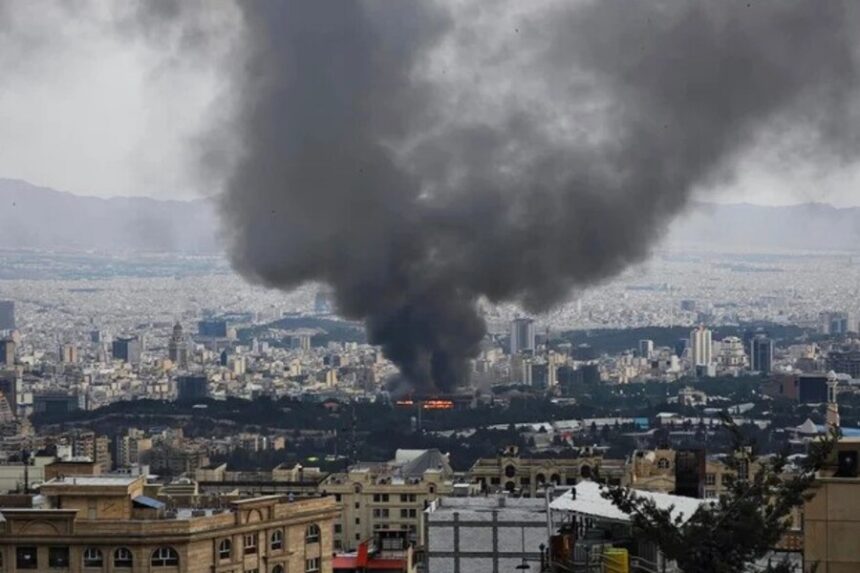Israel launched a direct airstrike on Iranian state-run television in central Tehran on Monday, intensifying a rapidly escalating conflict that has brought the two regional powers to the brink of all-out war. The strike, which disrupted a live broadcast and left the network’s headquarters in flames, came just hours after Iran fired a fresh barrage of missiles into Israeli cities, killing at least eight civilians and injuring dozens more.
The Israeli military followed the strike with an urgent warning to the Iranian public, advising as many as 330,000 residents in central Tehran to evacuate immediately. The area includes police headquarters, three major hospitals, and the state-run broadcaster IRINN, all within a zone now declared a “military target.” Israeli Defense Minister Yoav Gallant confirmed that the strike was in direct retaliation for what Israel called deliberate attacks on civilians.
The televised explosion in Tehran occurred during a live news segment. Anchor Sahar Emami was seen fleeing the set as the screen behind her shattered and smoke filled the room. Moments later, she resumed broadcasting from another studio, reporting fatalities among her colleagues and damage to the building. Eyewitnesses reported widespread panic across the capital, with traffic gridlocked as residents attempted to flee.
Iran’s Revolutionary Guard responded by launching over 100 missiles targeting Israel. Iranian officials claim the strikes are in response to four days of relentless Israeli bombardment, which Tehran says has killed at least 224 people. Rights organizations contend the actual death toll is significantly higher, with some reports suggesting over 400 fatalities, nearly half of them civilians.
In Israel, the attacks struck deep into urban centers. In Petah Tikva, a city near Tel Aviv, five people were killed after missiles ripped through a residential building. Among the dead were four elderly civilians and another unidentified individual. Emergency services rescued a four-day-old baby from beneath rubble while fires engulfed the building. Over 90 additional injuries were reported.
The Israeli Defense Forces (IDF) stated on Monday that their air force had neutralized over 120 missile launchers in Iran, with many belonging to the Quds Force, an elite unit of Iran’s Revolutionary Guard responsible for foreign operations. IDF spokesperson Brig. Gen. Effie Defrin declared Israel now holds “full aerial superiority over Tehran” and claimed the strikes had eliminated one-third of Iran’s known missile launch infrastructure.
Former President Donald Trump, speaking from the G7 summit in Canada, reiterated his hardline stance on Iran. Posting on Truth Social, Trump warned Tehran residents to evacuate “before there is nothing left,” adding that Iran “should have signed the deal” when given the chance. He emphasized, “IRAN CAN NOT HAVE A NUCLEAR WEAPON.”
Although Trump signed the G7’s joint statement affirming Israel’s right to self-defense and condemning Iran’s regional aggression, he later rebuked French President Emmanuel Macron’s suggestion that he had returned to Washington to broker a ceasefire. Trump called such reports “fake” and claimed his return was for reasons “much bigger than that.”
As the violence escalated, U.S. Defense Secretary Pete Hegseth announced the deployment of additional military assets to the Middle East, including the USS Nimitz carrier strike group and refueling aircraft prepositioned in Europe. The State Department also raised its Israel travel advisory to Level 4 — its highest warning Americans against visiting the region. A missile strike near the U.S. Consulate in Tel Aviv caused minor damage but no injuries.
In Tehran, the situation continued to deteriorate. An estimated 80% to 90% of businesses were shuttered on Monday, with air raid sirens, anti-aircraft fire, and widespread panic marking the city’s atmosphere. Iranian health officials said more than 1,200 people had been injured in the strikes, though they declined to specify how many were military personnel.
Meanwhile, diplomatic efforts to address Iran’s nuclear ambitions have collapsed. A planned meeting between the U.S. and Iran was canceled amid the violence. Netanyahu declared that Israeli strikes had pushed back Iran’s nuclear program by “a very, very long time,” while Iran promised that further missile rounds would be “more forceful, severe, precise and destructive than previous ones.”
Though Iran insists its nuclear pursuits are peaceful, Western analysts believe Tehran is closer than ever to weapons-grade uranium stockpiles. If converted, Iran could theoretically build multiple nuclear warheads within months.
The international community has expressed growing alarm over the unfolding crisis, which now involves civilian casualties on a mass scale, threats to energy markets, and heightened military readiness across the Middle East. Yet both Iran and Israel appear unwilling to de-escalate, raising fears that a full-scale regional war may soon erupt.
With no clear off-ramp in sight, Monday’s developments mark a dangerous new phase in the decades-long conflict between Israel and Iran — one in which diplomacy has all but collapsed and war is no longer being fought in the shadows.




